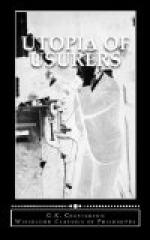(4) But lastly, it is not necessary that in the factories of the future the institution of physical punishment should actually remind people of the jambok or the knout. It could easily be developed out of the many forms of physical discipline which are already used by employers on the excuses of education or hygiene. Already in some factories girls are obliged to swim whether they like it or not, or do gymnastics whether they like it or not. By a simple extension of hours or complication of exercises a pair of Swedish clubs could easily be so used as to leave their victim as exhausted as one who had come off the rack. I think it extremely likely that they will be.
IX. THE MASK OF SOCIALISM
The chief aim of all honest Socialists just now is to prevent the coming of Socialism. I do not say it as a sneer, but, on the contrary, as a compliment; a compliment to their political instinct and public spirit. I admit it may be called an exaggeration; but there really is a sort of sham Socialism that the modern politicians may quite possibly agree to set up; if they do succeed in setting it up, the battle for the poor is lost.
We must note, first of all, a general truth about the curious time we live in. It will not be so difficult as some people may suppose to make the Servile State look rather like Socialism, especially to the more pedantic kind of Socialist. The reason is this. The old lucid and trenchant expounder of Socialism, such as Blatchford or Fred Henderson, always describes the economic power of the plutocrats as consisting in private property. Of course, in a sense, this is quite true; though they too often miss the point that private property, as such, is not the same as property confined to the few. But the truth is that the situation has grown much more subtle; perhaps too subtle, not to say too insane, for straight-thinking theorists like Blatchford. The rich man to-day does not only rule by using private property; he also rules by treating public property as if it were private property. A man like Lord Murray pulled the strings, especially the pursestrings; but the whole point of his position was that all sorts of strings had got entangled. The secret strength of the money he held did not lie merely in the fact that it was his money. It lay precisely in the fact that nobody had any clear idea of whether it was his money, or his successor’s money, or his brother’s money, or the Marconi Company’s money, or the Liberal Party’s money, or the English Nation’s money. It was buried treasure; but it was not private property. It was the acme of plutocracy because it was not private property. Now, by following this precedent, this unprincipled vagueness about official and unofficial moneys by the cheerful habit of always mixing up the money in the pocket with the money in the till, it would be quite possible to keep the rich as rich as




